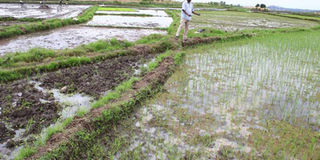Breaking News: At least 10 feared to have drowned in Makueni river
New rice variety yielding up to 7 tonnes per hectare to be released

Moses Kariithi, a rice farmer in Mwea, Kirinyaga, during an interview in 2015. With the introduction of a new, high-yielding rice variety, researchers believe that smallholder farmers will be able access the hybrid seeds and enhanced harvests. FILE PHOTO | JOSEPH KANYI | NATION MEDIA GROUP
What you need to know:
- Rice farmers are set better things after regional scientists announced the release of a high-yielding hybrid rice variety.
- Kenya will be among the first countries to benefit from this pioneering breakthrough in rice breeding in sub-Saharan Africa.
- Hybrid rice seeds currently being planted in Africa are either imported from Asia or America. Egypt, is the only country in Africa that has developed its own rice hybrids.
- It is estimated that Kenya has an annual production of 102,000 tonnes and imported 420,000 tonnes in 2015. There is a huge a huge deficit in the country.
Rice farmers are set for a big boom after regional scientists announced the release of a high-yielding hybrid rice variety with a potential of producing seven tonnes per hectare.
Dr Denis Kyetere, the executive director of African Agricultural Technology Foundation (AATF), which coordinates the Hybrid Rice project says, the new variety will be available in the country in the next few months.
“Hybrid rice technology revolutionised rice production in Asia dramatically increasing productivity from an average of 1.89 tonnes per hectare in 1949 to 6.71 in 2012, and it will do the same for Africa,” he said, noting Kenya will be among the first countries to benefit from this pioneering breakthrough in rice breeding in sub-Saharan Africa.
The project is further evaluating the performance of 127 rice hybrids for advancement to national performance trials, according to Dr Kayode Sanni, the project manager.
HYBRID RICE SEEDS
Hybrid rice seeds currently being planted in Africa are either imported from Asia or America. Egypt, is the only country in Africa that has developed its own rice hybrids.
With this breakthrough, the researchers believe that smallholder farmers will be able access high-yielding hybrid seeds and enhanced harvests.
Kenya is among the countries that heavily rely on rice imports, with an annual demand of milled rice standing at 550,000 tonnes, which outstrips its production.
It is estimated that Kenya has an annual production of 102,000 tonnes and imported 420,000 tonnes in 2015. There is a huge a huge deficit in the country.





